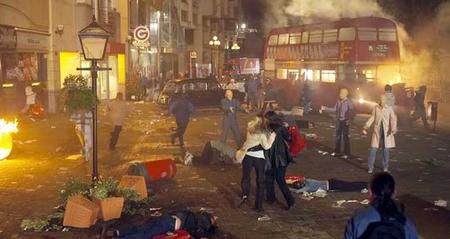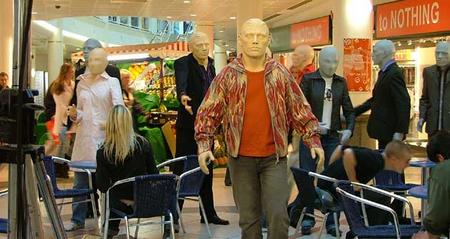March 28, 2005
The new Dr Who - the k-punk verdict
'Dismembered limbs, a severed head, a hand cut off at the wrist, as in a fairy tale of Hauff's, feet which dance by themselves, as in the book by Schaeffer which I mentioned above — all these have something peculiarly uncanny about them, especially when, as in the last instance, they prove capable of independent activity in addition.'
- Freud, 'The Uncanny'
It ought to have been textbook uncanny. The Autons seemed to have been designed with one eye on 1970's commodities (they first appeared in Pertwee's first episode, 'Spearhead from Space' in 1970, which was also the first time the show was broadcast in colour) and one eye on Freud's 1919 essay.*
The reasons why it didn't quite succeed were not specific to the programme. The problems it faces are the afflictions of more of less all contemporary 'quality' British television, which, increasingly and depressingly, seems to take its cues from British film. What made it feel slightly like a commercial for itself is the pace - far too breathless - and the glossy film stock that all quality TV is now required by law to use. Low budgets force innovation - expense so often leads to an unthinking dependence upon defaults.
The most telling example of this is the music. If only Russell T Davies had the courage to return to the original Delia Derbyshire recording of the theme tune: the addition of 'lush' strings only subtracts from the untimely abstract thrill of its alien electro-pulse. But, more than anything else, it is the incidental music that stops the programme feeling as uncanny as it once did. Hectic technopop and Spielberg/ John Williams-style stringfests call up the off-the-peg affective register triggered by the Hollywood Adventure mode. But watch the series in its classic years and you become aware of how extreme the incidental 'music' could be. In 'The Sea Devils', as Nick Gutterbreakz argued a while back, the atonal echoing electronic screams were barely music at all. The comparison with Throbbing Gristle was not at all idle. There is a wider difficulty here, of course. If the original series benefitted from a surrounding popular culture that was vibrant and experimental, the new one is hidebound by a deeply conservative popcultural context.
Eccleston delivered all the intensity you could expect (but you are left with the question: what is the trademark of his Doctor? The classic incarnations could be summed up in a quick phrase - 'cosmic hobo', 'dandy' - but, at the moment, Eccleston seems to be defined negatively: he doesn't look Edwardian nor use RP). At the moment, he, like the series in general, has merely opened up the space for a new Doctor Who - he hasn't convincingly occupied that space. But, given the constraints, the pressure of expectations, the prevailing vampiricist smugemony, creating such a space is an enormous achievement.
(I saw Billie Piper described as 'dressing like she is a member of Girls Aloud', so, naturally, I approve of her. :-) Seriously, though, she brings an accessible glamour and resourcefulness to the part of Rose that makes her modern without being inusfferably 'street smart'. No danger of the Poochie syndrome, here. The point at which she failed to notice that her boyfriend had been replaced by an Auton duplicate was one of several moments of humour that really worked.)
The success of the classic serial depended upon its shameless appropriation and redeployment of concepts and tropes stolen not only from SF (Kneale, Wells) but also Horror (predictably, my favourite era was the Philip Hinchcliffe 'Gothic' era), detective fictions, myth, history... The opening episode was, predictably and understandably, fed almost entirely on the programme's own history. I should add that it did so with a real wit and affection.
Scanshifts and I identified two challenges that the revivified serial must overcome if it is to succeed: fittingly, they concern time and space. If the serial is to persist with one-off, one-episode adventures, it will work much better if it has less ambition about what it can achieve in 45 minutes. Launch and relaunch episodes are always weighed down by too much exposition, which meant that a degree of rushing about was always going to be inevitable. Closer focus on a confined space, with a strongly defined atmosphere, would surely be a better model for future episodes. There are certain things which cannot easily be done in that attenuated time-frame - the slow-building sense that something is amiss, the gradual accretion of anomalous signs, the forming of hypotheses - all of this before the monster(s) appears... that just seems impossible if you only have forty-five minutes.
I'm hoping that, once the new serial can acquire the confidence it deserves, it will have the nerve to break away from the overlit dullness of contemporary British television's obligatory naturalism. Certainly, I'm heartened by the fact that it managed two million more viewers than ITV's Ant and Dec - which featured David Beckham! and Mariah Carey! Maybe - tentacles crossed - the tide is finally turning against celebrealism. Maybe the Britain that Simon evoked yesterday when he talked of a country that was both seedier and stranger than Blair's Mission Statement nation, maybe that Briain is rediscovering itself....
* Dismembered footnote: It should be remembered, though, that Freud goes out of his way to seek to dismiss the idea that ‘doubts whether an apparently animate being is really alive; or conversely, whether a lifeless object might not be in fact animate’ was definitional of the uncanny.
Final note: Russell T Davies' version of the life of Casanova was an unqualifed success, which anyone who didn't see it on BBC Three should make a point of catching when it is broadcast on one of the terrestrial channels. Costume drama that looks like it is modelled on Adam and the Ants videos... Clothes that owe more to Leigh Bowery than to the historical record... Dance scenes that fly from even the pretence of naturalism to attain an oneiric expressionism.... A lead who manages, somehow, to find the diagonal between the Scylla (Lad) and Charybdis (Camp) of contemporary masculinity ... Yes, it really did happen... (And that's not even mentioning Peter O'Toole in a marvellous performance as the dying roué).
Posted by mark at March 28, 2005 12:57 PM | TrackBack
